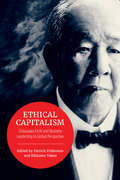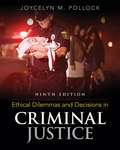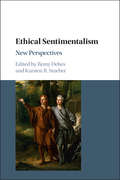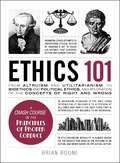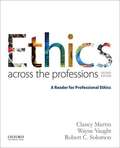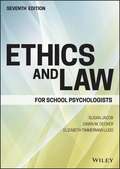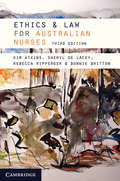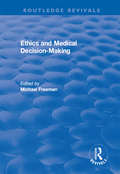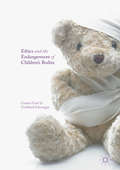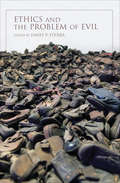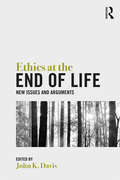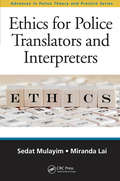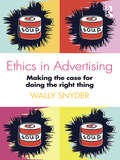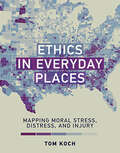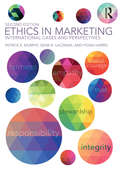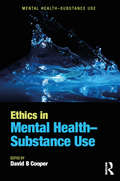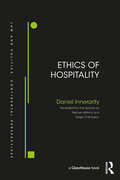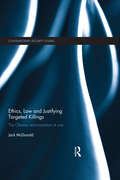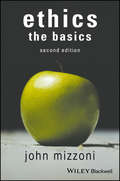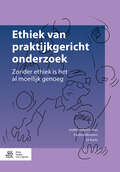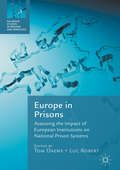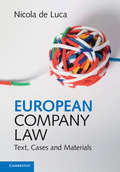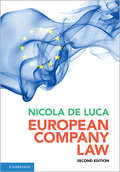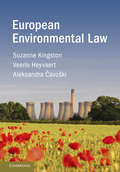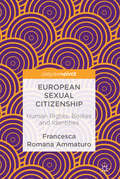- Table View
- List View
Ethical Capitalism: Shibusawa Eiichi and Business Leadership in Global Perspective
by Kikkawa Takeo Patrick FridensonShibusawa Eiichi (1840–1931) was a Japanese banker and industrialist who spearheaded the modernization of Japanese industry and finance during the Meji Restoration. He founded the first modern bank in Japan and his reforms introduced double entry accounting and joint-stock corporations to the Japanese economy. Today, he is known as the “father of Japanese capitalism.” Ethical Capitalism is a volume of essays that tackles the thought, work, and legacy of Shibusawa Eiichi and offers international comparisons with the Japanese experience. Eiichi advocated for gapponshugi, a principle that emphasized developing the right business, with the right people, in service to the public good. The contributors build a historical perspective on morality and ethics in the business world that, unlike corporate social responsibility, concentrates on the morality inside firms, industries, and private-public partnerships. Ethical Capitalism is not only a timely work; it is a necessary work, in a rapidly globalizing world where deregulation and lack of oversight risk repeating the financial, environmental, and social catastrophes of the past.
Ethical Dilemmas And Decisions In Criminal Justice, 9th Edition
by Joycelyn M. PollockPacked with current, real-world examples, the text offers comprehensive coverage of ethics across all three arms of the criminal justice system: the police, the courts, and corrections. It combines coverage of the philosophical principles and theories that are the foundation of ethical decision-making with the latest challenges and issues in criminal justice -- militarization of the police, mass imprisonment, wrongful convictions, the misuse of power by public servants, and more. <P><P> Hands-on exercises, real-life cases, and practical scenarios illustrate the significance of ethics in today's criminal justice arena. Whether you plan to work in the field of policing, courts, or corrections, this book delivers the information and tools you need to deal effectively with ethical challenges on the job.
Ethical Sentimentalism: New Perspectives
by Remy Debes Stueber Karsten R.In recent years there has been a tremendous resurgence of interest in ethical sentimentalism, a moral theory first articulated during the Scottish Enlightenment. Ethical Sentimentalism promises a conception of morality that is grounded in a realistic account of human psychology, which, correspondingly, acknowledges the central place of emotion in our moral lives. However, this promise has encountered its share of philosophical difficulties. Chief among them is the question of how to square the limited scope of human motivation and psychological mechanism - so easily influenced by personal, social, and cultural circumstance - with the seeming universal scope and objective nature of moral judgment. The essays in this volume provide a comprehensive evaluation of the sentimentalist project with a particular eye to this difficulty. Each essay offers critical clarification, innovative answers to central challenges, and new directions for ethical sentimentalism in general.
Ethics 101: From Altruism and Utilitarianism to Bioethics and Political Ethics, an Exploration of the Concepts of Right and Wrong (Adams 101)
by Brian BooneExplore the mysteries of morality and the concept of right and wrong with this accessible, engaging guide featuring basic facts along with an overview of modern-day issues ranging from business ethics and bioethics to political and social ethics.Ethics 101 offers an exciting look into the history of moral principles that dictate human behavior. Unlike traditional textbooks that overwhelm, this easy-to-read guide presents the key concepts of ethics in fun, straightforward lessons and exercises featuring only the most important facts, theories, and ideas. Ethics 101 includes unique, accessible elements such as: -Explanations of the major moral philosophies including utilitarianism, deontology, virtue ethics, and eastern philosophers including Avicenna, Buddha, and Confucius. -Classic thought exercises including the trolley problem, the sorites paradox, and agency theory -Unique profiles of the greatest characters in moral philosophy -An explanation of modern applied ethics in bioethics, business ethics, political ethics, professional ethics, organizational ethics, and social ethics From Plato to Jean-Paul Sartre and utilitarianism to antirealism, Ethics 101 is jam-packed with enlightening information that you can’t get anywhere else!
Ethics Across The Professions: A Reader For Professional Ethics
by Clancy Martin Robert C. Solomon Wayne VaughtThe most up-to-date reader with cases in professional ethics available.What does it mean to be an ethical professional? A professional career can be so demanding that it permeates every aspect of a person's life and personality. In light of this fact, it is especially important for students who are planning to enter a chosen profession to understand its moral status,moral virtues, and possible moral pitfalls, so that they will be equipped to deal with the inevitable moral quandaries that they will encounter as professionals.The most up-to-date professional ethics reader available, Ethics Across the Professions analyzes the complex ethical issues that arise in such fields as engineering, finance, healthcare, journalism, and law. Featuring a wide array of both classic and contemporary sources, it ranges from works byAristotle and Kant to selections by Michael Bayles, Sissela Bok, Paul Ekman, and Thomas Nagel. Organized topically, the anthology covers what it means to be a professional, outlines several ethical models, and addresses key issues including deception in professional life, privacy, loyalty, socialwelfare, conflicts of interest, and self-regulation. The book includes detailed chapter introductions, several practical case studies at the end of each chapter, and provocative discussion questions on issues like "whistle-blowing," the Iraq War, educating illegal immigrant children, andadvertisements for pharmaceutical companies. Edited by three renowned ethicists, Ethics Across the Professions is especially suited for introductory professional ethics courses taught in philosophy departments as well as in nursing schools, business schools, and other professional programs.
Ethics And Law For School Psychologists (Seventh Edition)
by Jacob Dawn M. Decker Susan Jacob Elizabeth Timmerman LuggThere are a number of excellent texts, journal articles, and book chapters on ethics in psychology, legal issues in school psychology, and special education law. However, in the late 1980s, the authors of the first edition of this book recognized a need for a single sourcebook on ethics and law specifically written to meet the unique needs of the psychologist in the school setting. Consequently, Ethics and Law for School Psychologists was written to provide up-to-date information on ethical principles and standards and law pertinent to the delivery of school psychological services.
Ethics and Law for Australian Nurses
by Kim Atkins Bonnie Britton De Lacey Sheryl Rebecca RippergerThe third edition of Ethics and Law for Australian Nurses develops an innovative practical framework for understanding the ethical and legal dimensions of nursing practice in Australia. Taking a 'relational' approach to practice, the text foregrounds the concepts of personhood, vulnerability and the nurse-patient relationship as the source of a nurse's moral and legal obligations. This approach is central to the book's discussion of key ethical and legal concepts throughout the text including consent and autonomy, negligence and liability, confidentiality and trust, and culturally safe practice. This edition has been thoroughly revised to include the latest research and methods, updated legislation and links to professional documentation, along with a new chapter on aged care. Student learning is supported by case studies, legal case extracts and learning exercises. A new instructor companion website features a curated suite of multimedia resources and extension questions.
Ethics and Medical Decision-Making (Routledge Revivals)
by Michael D. FreemanThis title was first published in 2001: Ethical thinking about medical decision-making has roots deep in history. This collection of contemporary essays by leading international scholars traces the development of modern bioethics and explores the theory and current issues surrounding this widely contested field.
Ethics and the Endangerment of Children's Bodies
by Gunter Graf Gottfried SchweigerThis book addresses the endangerment of children's bodies in affluent societies. Bodily integrity is an important part of a child's physical and mental well-being, but it can also be violated through various threats during childhood; not only affecting physical health but also causing mental damage and leading to distortions in the development of the self. The authors give an account of three areas, which present different serious dangers: (1) body and eating, (2) body and sexuality, and (3) body and violence. Through an in-depth examination of the available theoretical and empirical knowledge, as well as a thorough ethical analysis, the central injustices in the mentioned areas are identified and the agents with responsibilities towards children displayed. The authors conclude by providing invaluable insight into the necessity of an ethical basis for policies to safeguard children and their bodies.
Ethics and the Problem of Evil (Indiana Series in the Philosophy of Religion)
by John Hare Laura Garcia Stephen Maitzen Bruce Russell Marilyn McCord Adams Linda Zagzebski Stephen J. WykstraProvocative essays that seek &“to turn the attention of analytic philosophy of religion on the problem of evil . . . towards advances in ethical theory&” (Reading Religion). The contributors to this book—Marilyn McCord Adams, John Hare, Linda Zagzebski, Laura Garcia, Bruce Russell, Stephen Wykstra, and Stephen Maitzen—attended two University of Notre Dame conferences in which they addressed the thesis that there are yet untapped resources in ethical theory for affecting a more adequate solution to the problem of evil. The problem of evil has been an extremely active area of study in the philosophy of religion for many years. Until now, most sources have focused on logical, metaphysical, and epistemological issues, leaving moral questions as open territory. With the resources of ethical theory firmly in hand, this volume provides lively insight into this ageless philosophical issue. &“These essays—and others—will be of primary interest to scholars working in analytic philosophy of religion from a self-consciously Christian standpoint, but its audience is not limited to such persons. The book offers illustrative examples of how scholars in philosophy of religion understand their aims and how they go about making their arguments . . . hopefully more work will follow this volume&’s lead.&”—Reading Religion &“Recommended.&”—Choice
Ethics at the End of Life: New Issues and Arguments
by John DavisThe 14 chapters in Ethics at the End of Life: New Issues and Arguments, all published here for the first time, focus on recent thinking in this important area, helping initiate issues and lines of argument that have not been explored previously. At the same time, a reader can use this volume to become oriented to the established questions and positions in end of life ethics, both because new questions are set in their context, and because most of the chapters—written by a team of experts—survey the field as well as add to it. Each chapter includes initial summaries, final conclusions, and a Related Topics section.
Ethics for Police Translators and Interpreters (Advances in Police Theory and Practice)
by Sedat Mulayim Miranda LaiThis book examines the major theoretical foundations of ethics, before zooming in on definitions of professional practice and applied professional ethics, as distinct from private morals, in general and then focusing on professional ethics for translators and interpreters in police and legal settings. The book concludes with a chapter that offers a model for ethical decision making in the profession.
Ethics in Advertising: Making the case for doing the right thing
by Wally SnyderThis book provides students and practitioners with a comprehensive overview of the rules and principles associated with ethical advertising practices. With extensive research, and a variety of case studies, and expert opinions, it discusses why advertising ethics is important both to the consumer and the professional. The author presents the rules of ethical conduct recommended by the Institute for Advertising Ethics and demonstrates how these are applied in practice, examining why ethics is important; what the ethical dilemmas the industry faces are; and how to motivate better practices among professionals. The book uses real life stories of "native advertising," marketing to children, and diversity in advertising to show how professionals can be inspired to "do the right thing" for consumers and their companies. Readers will learn how they can solve ethical dilemmas to their personal satisfaction in the competitive work environment. This balanced perspective to the ethical issues that arise in the advertising industry is sure to resonate with students of advertising and marketing.
Ethics in Everyday Places: Mapping Moral Stress, Distress, and Injury (Basic Bioethics)
by Tom KochAn exploration of moral stress, distress, and injuries inherent in modern society through the maps that pervade academic and public communications worlds.In Ethics in Everyday Places, ethicist and geographer Tom Koch considers what happens when, as he puts it, “you do everything right but know you've done something wrong." The resulting moral stress and injury, he argues, are pervasive in modern Western society. Koch makes his argument "from the ground up," from the perspective of average persons, and through a revealing series of maps in which issues of ethics and morality are embedded.The book begins with a general grounding in both moral stress and mapping as a means of investigation. The author then examines the ethical dilemmas of mapmakers and others in the popular media and the sciences, including graphic artists, journalists, researchers, and social scientists. Koch expands from the particular to the general, from mapmaker and journalist to the readers of maps and news. He explores the moral stress and injury in educational funding, poverty, and income inequality ("Why aren't we angry that one in eight fellow citizens lives in federally certified poverty?"), transportation modeling (seen in the iconic map of the London transit system and the hidden realities of exclusion), and U.S. graft organ transplantation.This uniquely interdisciplinary work rewrites our understanding of the nature of moral stress, distress and injury, and ethics in modern life. Written accessibly and engagingly, it transforms how we think of ethics—personal and professional—amid the often conflicting moral injunctions across modern society.Copublished with Esri Press
Ethics in Marketing: International cases and perspectives
by Patrick E. Murphy Gene R. Laczniak Fiona HarrisUnderstanding and appreciating the ethical dilemmas associated with business is an important dimension of marketing strategy. Increasingly, matters of corporate social responsibility are part of marketing's domain. Ethics in Marketing contains 20 cases that deal with a variety of ethical issues such as questionable selling practices, exploitative advertising, counterfeiting, product safety, apparent bribery and channel conflict that companies face across the world. A hallmark of this book is its international dimension along with high-profile case studies that represent situations in European, North American, Chinese, Indian and South American companies. Well known multinationals like Coca Cola, Facebook, VISA and Zara are featured. This second edition of Ethics in Marketing has been thoroughly updated and includes new international cases from globally recognized organizations on gift giving, sustainability, retail practices, multiculturalism, sweat shop labor and sports sponsorship. This unique case-book provides students with a global perspective on ethics in marketing and can be used in a free standing course on marketing ethics or marketing and society or it can be used as a supplement for other marketing classes.
Ethics in Mental Health-Substance Use (Mental Health–Substance Use)
by David B CooperEthics in Mental Health-Substance Use aims to explore the comprehensive concerns and dilemmas occurring from mental health and substance use problems, and to inform, develop, and educate by sharing and pooling knowledge, and enhancing expertise, in this fast developing region of ethics and ethical care and practice. This volume concentrates on ethical concerns, dilemmas, and concepts specifically interrelated, as a collation of problem(s) that directly or indirectly affect the life of the individual and family. Whilst presenting a balanced view of what is ethically best practice today, this title challenges concepts and stimulates debate, exploring all aspects of the development in treatment, intervention and care responses, and the adoption of research-led best practice.
Ethics of Hospitality (Law and Politics)
by Daniel InnerarityThe source of hospitality lies in the fundamental ethical experiences that make up the fabric of the social lives of people. Therein lies a primary form of humanity. Whether we are guests or hosts, this reveals our situation in a world made up of receiving and meeting, leaving room for the liberty to give and receive beyond the imperatives of reciprocity. This book proposes an ethic that promotes the possibility of stirring emotion before that of protecting ourselves from unexpected encounters. Fundamental ethical competence consists of opening up to the wholly other and to others, to be accessible to the world’s solicitations. There is moral superiority of vulnerable love over control and moderation, of generous passion over rational prudence and of excess over exchange. Constructing an ethic of hospitality is essential at a time when we are torn between the imperatives of modernization and growth and the demands of concern and protection. The experience we all have today, that of the fragility of the world, is giving rise to a powerful tendency toward solicitude. From such a perspective, the duty of individuals no longer consists of protecting themselves from society, but of defending it, taking care of a social fabric outside of which no identity can be formed.
Ethics, Law and Justifying Targeted Killings: The Obama Administration at War (Contemporary Security Studies)
by Jack McDonaldThis book examines the normative debates around the American use of targeted killings. It questions whether the Obama administration’s defence of its use of targeted killings is cohesive or hypocritical. In doing so, the book departs from the disciplinary purpose of international law, constitutional law and the just war tradition and instead examines discipline-specific defences of targeted killings to identify their requisite normative principles in order to compare these norms across disciplines. The methodology used in this book means that it argues that targeted killings are only defensible as acts of war, but it also highlights the normative role of accountability and responsibility in this defence. In doing so, it offers an argument that the use of ‘pattern of life’ killings by the CIA falls outside the defence offered by the Obama administration, but that this same type of targeting could be used by the military due to differing standards/mechanisms of responsibility assignment in these organisations. The book thus provides a way of investigating contemporary wars where the conduct of war lacks the traditional hallmarks of conventional warfare. Furthermore, by drawing attention to differing normative concepts that underpin competing interpretations of law and morality, it provides a way of analysing contemporary political violence in an interdisciplinary fashion without seeking to displace single disciplinary study. This book will be of much interest to students of military studies, ethics of war, foreign policy, international security and IR.
Ethics: The Basics, 2nd Edition
by John MizzoniUpdated and revised, Ethics: The Basics, Second Edition, introduces students to fundamental ethical concepts, principles, theories, and traditions while providing them with the conceptual tools necessary to think critically about ethical issues. Introduces students to core philosophical problems in ethics in a uniquely reader-friendly manner Lays out clearly and simply a rich collection of ethical concepts, principles, theories, and traditions that are prevalent in today’s society Considers western and non-western viewpoints and religious interpretations of ethical principles Offers a framework for students to think about and navigate through an array of philosophical questions about ethics
Ethiek van praktijkgericht onderzoek: Zonder Ethiek Is Het Al Moeilijk Genoeg
by Eveline Wouters Sil AartsDit boek heeft als doel onderzoekers in de praktijk, en met name begeleiders van onderzoek in de praktijk op het hbo en daarbuiten, een handreiking te bieden om ethische dilemma’s waar te nemen en bespreekbaar te maken. Onderzoek in de praktijk is al lastig op zich, het goed herkennen, omgaan met en begeleiden van situaties die ethische vragen oproepen, die gaan over wat goed, wenselijk en verantwoord onderzoek is, maken het onderzoek nog lastiger. Aan de hand van verschillende fases van het onderzoek (vanaf het eerste idee tot en met de rapportage) worden verschillende ethische vraagstukken besproken. Deze vraagstukken gaan vaak over de afweging hoe het belang van de (individuele) deelnemer opweegt tegen het belang van de kennisontwikkeling door middel va het onderzoek of het belang van de onderzoeker. Maar ook: wat te doen met vertrouwelijke informatie, of de wensen van de opdrachtgever, hoe de resultaten eerlijk gepresenteerd kunnen worden en vele andere vraagstukken. Deze worden alle geïllustreerd met voorbeelden uit de praktijk. Daarnaast wordt specifiek ingegaan op dilemma’s rondom beoordelen van (afstudeer)werk, de nieuwe technologische mogelijkheden van dataverzameling (big data), en de wet- en regelgeving.
Europe in Prisons
by Tom Daems Luc RobertThis volume explores the role that European institutions have come to play in regulating national prisons systems. The authors introduce and contribute to advancing a new research agenda in international penology ('Europe in prisons') which complements the conventional comparative approach ('prisons in Europe'). The chapters examine the impact - if any - that institutions such as the European Committee for the Prevention of Torture and Inhuman or Degrading Treatment or Punishment and the European Court of Human Rights have had on prison policy throughout Europe. With contributions from a wide range of countries such as Albania, Austria, Belgium, Ireland, Norway and Spain, this edited collection offers a wide-ranging and authoritative guide to the effects of European institutions on prison policy.
European Company Law
by Nicola De LucaTaking a text, cases and materials approach, this is the first and only student textbook on European company law, providing an insight into the subject and shedding light on its future development. Textboxes for explanatory commentary, cases and materials - such as EU legislation, official documents and excerpts from scholarly papers - are clearly differentiated from the text, allowing the student to quickly identify sources. Each chapter also includes suggestions for further reading. Structured in seven parts, the book explores a diversity of topics, from what European company law is, the common rules for establishing, financing and accounting a company, and corporate governance, to the structure of the Societas Europaeca Statute, EU company law directives, capital markets and takeover law, and insolvency. An essential resource for the growing number of graduate courses on European company law, European business law, and comparative corporate law.
European Company Law: Text, Cases And Materials
by Nicola de LucaTaking a text, cases and materials approach, de Luca's successful textbook remains the only offering for students of European company law, and has been thoroughly updated in this new edition. Chapters have been expanded to cover the latest legislation and directives on cross-border mergers, the use of digital tools, and cross-border insolvency, while figures and graphs have been introduced to help illustrate complex processes and relationships. Clearly differentiated explanatory textboxes from the first edition have been revised, and allow students to quickly identify sources such as EU legislation, official documents and excerpts from scholarly papers. The book explores a diverse range of topics, from what European company law is, to the structure of the Societas Europaea Statute, capital markets and takeover law. It continues to be an essential resource for the growing number of graduate courses in European company law, European business law, and comparative corporate law.
European Environmental Law (Routledge Research In European Union Law Ser.)
by Suzanne Kingston Veerle Heyvaert Aleksandra ČavoškiEU Environmental Law is a critical, comprehensive and engaging account of the essential and emerging issues in European environmental law and regulation today. Suitable for advanced undergraduate and postgraduate students, the book delivers a thematic and contextual treatment of the subject for those taking courses in environmental law, environmental studies, regulation and public policy, and government and international relations. Placing the key issues in context, EU Environmental Law takes an interdisciplinary and thematic approach to help students to better understand the implementation and enforcement of environmental law and policy across Europe. It offers an accessible overview, and links theory with practical applications that will allow students to contextualise the outcomes of legal rules and their impact on public and private behaviours. It provides a definitive account of the subject, examining traditional topics such as nature conservation law, waste law and water law, alongside increasingly important fields such as the law of climate change, environmental human rights law, and regulation of GMOs and nanotechnology.
European Sexual Citizenship: Human Rights, Bodies and Identities
by Francesca Romana AmmaturoThis book is an innovative and critical contribution to the study of the human rights of lesbian, gay, bisexual, transgender, intersex and queer (LGBTIQ) people in the context of Europe. Combining legal and Foucauldian approaches, it investigates the ways in which current discourses about LGBTIQ rights in Europe are tightly bound to contemporary debates about national and trans-national citizenship. The author defines and analyzes the concept of 'multisexual citizenship' to illustrate new, flexible forms of sexual and gendered citizenship that could radically transform practices of citizenship and the current human rights framework in Europe. She does this by combining critical deconstructions of the case law of the European Court of Human Rights with ethnographic observations and sociological analysis. This interdisciplinary work will appeal to sociologists, lawyers and researchers of gender and LGBTIQ rights.
